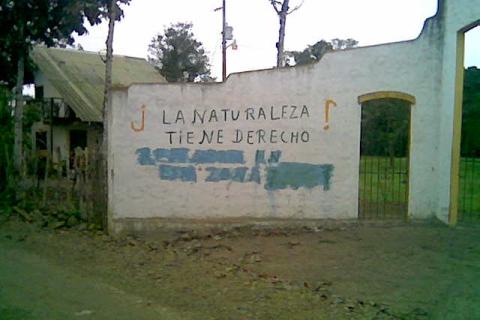All around the world there are women struggling every day of the year. Since the 20th century, however, International Women's Day has become a date on which their struggle is commemorated and highlighted. Women on every continent, urban, rural, indigenous, black, lesbian, among so many others, mark this date on the streets, raising their banners, which are countless, against gender inequalities that are manifested at the local and global levels.
Bulletin articles
Men and women peasant farmers in the Bajo Aguán valley in Honduras are suffering violent repression after organizing and taking action to regain control of their land, which had been granted to them as part of a thwarted agrarian reform process dating back to the early 1970s.
Business as usual dressed up in green
Humanity is moving along old paths in new clothes. The current civilization model, which is portrayed as hegemonic but actually corresponds to a small minority of the planet, is dragging it towards its limits, exposing it to multiple crises.
In view of the upcoming Rio+20 conference,(*) taking place this June, WRM would like to offer some background information on issues that will undoubtedly be at the top of the agenda of this international event. Among those issues are so-calledenvironmental services and related phenomena, such as payments for and trade in environmental services.
The term environmental services, also known as ecosystem services, includes the noun “service”, a term that is widely used in the capitalist market economy, in which companies and professionals provide and charge for a wide range of services. Therefore, environmental services suggests that there is, on the one hand, something or someone that offers or provides a service, and on the other, someone who receives or uses it. This logic also seems to apply to the case of environmental services and their “trade”.
To understand the emergence and development of the idea of environmental services, it is important to consider at least two crises that hit the industrialized countries of the North, particularly the U.S. and Europe, especially hard in the 1970s: the environmental crisis and the crisis of the capitalist economy.
How can the price of environmental services be established? How can it be determined, for example, what the “storage” and “production” of water is worth, or the pollination “work” done by insects? This has been a major obstacle for those who have sought to promote environmental services and their “trade”.
Two initiatives were of key importance in finding ways to price these “services”:(12)
Companies that promote monoculture tree plantations for the production of pulp, charcoal, timber and other purposes have attempted to ride the wave of the growth ofPES by claiming that their plantations also provide environmental services.
There has been a lot more talk recently about environmental services, especially in connection with preparations for the Rio+20 conference, taking place this June. To understand this, we should briefly address the central theme of this conference: the concept of the “green economy”.
Defenders of the idea of trade in environmental services claim that it is an excellent alternative for forest peoples, because it would leave the forest “standing” and ensure its conservation. But there are a series of reasons for saying no to environmental services and trade in environmental services:
Speculative capital and the stakeholders involved, such as banks, consultants, big companies and investment funds, along with allies like NGOs and often our own governments, are attempting to use trade in environmental services to take control of peoples’ lands in order to “sell” these services and make profits. This makes the struggle for the rights of peoples who depend on forests more complex and difficult.
How can this struggle be continued? Here are some possible steps to be taken:
As expected, the climate conference in Durban has not taken any significant decision in terms of combating the climate crisis. Maybe in 2020 a new binding agreement will be signed. 2020? According to the network of organizations and movements called Climate Justice Now, this constitutes a “crime against humanity”. It seems as if those governments who are the most responsible for the climate crisis have given up any consideration for the people who have become victims of the crisis, those who are affected or seriously threatened by climate change, especially poor women.

